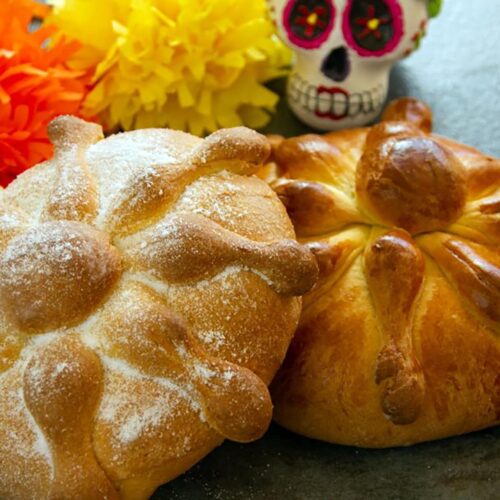
Pan de Muerto (Mexican Day of the Dead Bread)
Ingredients
- 1/4 cup milk
- 1/4 cup water
- 2 tbsp unsalted butter, room temperature
- 3 cups fall-purpose lour, divided
- 1/4 cup sugar
- 2-1/4 tsp active dry yeast
- 1-1/2 tsp ground anise
- 1 tsp salt
- 2 large eggs, at room temperature
- 1 egg, lightly beaten (for egg wash)
GLAZE/TOPPING
- 1 small orange, zested and juiced (roughly 1/4 c orange juice)
- 1/4 cup sugar, divided
Instructions
- In a small saucepan, heat the milk, water, and butter together until the butter has melted. Remove the pan from the heat and transfer the mixture to a shallow, wide bowl to cool to 80-90°F
- In a large bowl, mix together 1 c flour, sugar, yeast, salt, and anise. Add the cooled milk mixture and whisk until combined. Add the eggs and whisk until smooth.
- Add the remaining 1 ½ to 2 cups of flour gradually, mixing until each addition is fully incorporated before adding more. Add just as much flour as needed to form a soft, yet workable, dough
- Turn the dough out onto a lightly floured surface and knead for 5-7 minutes, adding any remaining flour as needed to keep the dough from sticking to your hands or the counter. Knead until the dough is smooth and soft, but doesn't stick to your hands.
- Transfer the dough to a lightly greased bowl. Cover it with a damp tea towel and let is rise in a warm, draft free place until doubled in bulk, roughly 1 hour.
- Cut 3 small portions (roughly 1.5 ounces each) and 1 smaller portion (roughly .5 oz) from your dough. Shape the 3 smaller portions into a rope that is roughly 6-7 inches long and has 4 bulges. (These are your ‘bones’.) Shape the smallest portion into a small ball (for the top).
- Shape the remaining larger portion of dough into a large ball and place it on a flour-dusted baking sheet. Brush it with the egg wash and layer the three "bones" across the top. Brush again with egg wash and press the smallest ball into the top where the bones meet. Brush the top ball with egg wash.
- Let the dough rise in a warm, draft-free place until it is puffy and nearly doubled in size, approximately 35-45 minutes. Near the end of the rising time, move your oven rack to the lowest position (this bread gets tall, and having extra space over the top of the bread in the oven will help it not darken so quickly) and preheat your oven to 350°F.
- Bake the bread for 20-25 minutes, until it sounds hollow when tapped. (The internal temperature taken with an instant-read thermometer should read 170°F.) If the crust appears to be browning too quickly towards the end of baking, you can tent it loosely with a piece of aluminum foil.
- While the bread is baking, make the glaze: Heat ¼ c sugar together with the zest and juice of one small orange. Bring the mixture to a simmer and simmer for 2-3 minutes. If necessary, strain the glaze of any orange pulp and set the strained glaze aside.
- When the bread is done, brush the warm loaf with the glaze and sprinkle with granulated sugar.
- Let the bread cool slightly before slicing.
Tried this recipe?Let us know how it was!